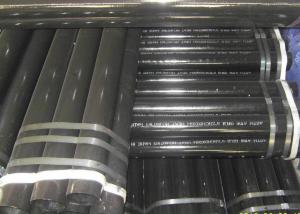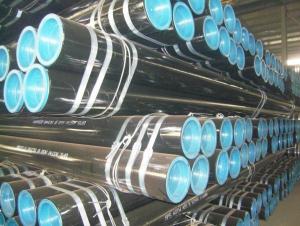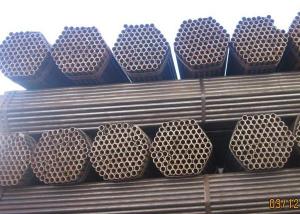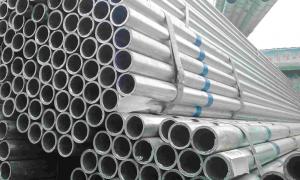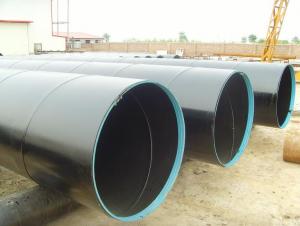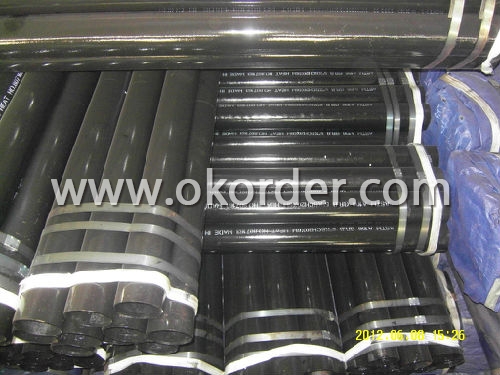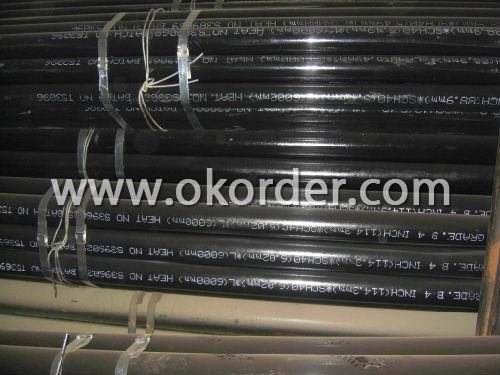Seamless Line Pipe X65
- Loading Port:
- Tian Jin Port
- Payment Terms:
- TT or LC
- Min Order Qty:
- 50MT m.t.
- Supply Capability:
- 5000 Tons Per Month m.t./month
OKorder Service Pledge
OKorder Financial Service
You Might Also Like
| |||||||||||||||||||||||||||||||||||||||||||||||||||||||||||||||||||||||||||||||||||||||||||||||||||||
|
- Q:Are steel pipes suitable for wastewater treatment facilities?
- Yes, steel pipes are suitable for wastewater treatment facilities. Steel pipes are known for their durability, strength, and resistance to corrosion, making them ideal for handling the corrosive and harsh nature of wastewater. Additionally, steel pipes can withstand high pressure and temperature variations, ensuring the efficient and reliable transportation of wastewater within the facility.
- Q:What is the maximum bending radius for steel pipes?
- The maximum bending radius for steel pipes depends on various factors, such as the pipe diameter, wall thickness, and the type of steel used. Generally, larger diameter pipes with thicker walls have a larger maximum bending radius. However, it is important to follow industry standards and guidelines to ensure the structural integrity of the pipe is maintained during the bending process. Consulting the manufacturer's specifications or referring to relevant codes and standards, such as the American Society of Mechanical Engineers (ASME) B31.1 or B31.3, can provide specific information on the maximum bending radius for steel pipes in different applications.
- Q:What is the difference between internal and external coating of steel pipes?
- The main difference between internal and external coating of steel pipes lies in the purpose and location of the coatings. The internal coating is applied on the inner surface of the steel pipe to protect it from corrosion and ensure smooth flow of the contents within the pipe. It is commonly used to prevent contamination of the transported liquid or gas and to extend the lifespan of the pipe. On the other hand, the external coating is applied on the outer surface of the steel pipe to protect it from environmental factors such as moisture, chemicals, and physical damage. It helps to prevent corrosion and maintain the structural integrity of the pipe, especially in harsh conditions. Overall, while the internal coating focuses on the functionality and preservation of the transported contents, the external coating primarily aims at safeguarding the pipe itself from external influences.
- Q:Are steel pipes resistant to corrosion?
- Yes, steel pipes are resistant to corrosion due to the protective layer formed by the oxide film on their surface. However, their resistance can vary depending on the specific type of steel and the conditions they are exposed to.
- Q:How does the price of steel pipes vary based on market demand?
- The price of steel pipes can vary based on market demand as it follows the basic economic principle of supply and demand. When the demand for steel pipes is high and the supply is limited, the price tends to increase. Conversely, when the demand is low and there is excess supply, the price tends to decrease. Factors such as infrastructure projects, industrial growth, and construction activities heavily influence the demand for steel pipes, thus impacting their price in the market.
- Q:How are steel pipes used in the aerospace manufacturing industry?
- Steel pipes are commonly used in the aerospace manufacturing industry for various applications. They are primarily used for the construction of aircraft structures, such as fuselages, wings, and landing gear. Steel pipes offer excellent strength and durability, making them suitable for withstanding the extreme conditions experienced during flight. Additionally, they are used in the aerospace industry to transport fluids, such as fuel and hydraulic systems, due to their ability to handle high pressure and temperature. Overall, steel pipes play a critical role in ensuring the safety, reliability, and performance of aircraft in the aerospace manufacturing industry.
- Q:What are the different methods of joining steel pipes?
- There are several different methods of joining steel pipes, including welding, threading, flanging, grooving, and using mechanical connectors.
- Q:What is the difference between steel pipes and PPR pipes?
- Steel pipes and PPR (Polypropylene Random Copolymer) pipes are two different types of pipes commonly used in various industries and applications. The main difference lies in their material composition and properties. Steel pipes are made from steel, a strong and durable metal. They are known for their high tensile strength, resistance to extreme temperatures, and ability to withstand high pressure. Steel pipes are commonly used for transporting fluids and gases in industries such as oil and gas, construction, and plumbing. On the other hand, PPR pipes are made from a type of plastic called polypropylene random copolymer. PPR pipes are known for their excellent thermal and chemical resistance, as well as their light weight and easy installation. They are commonly used for hot and cold water supply systems, as well as in heating and cooling applications. In summary, the key difference between steel pipes and PPR pipes lies in their material composition and properties. Steel pipes are stronger and more suitable for high-pressure and extreme temperature applications, while PPR pipes are lighter, easier to install, and ideal for water supply systems.
- Q:What is the role of steel pipes in sewage systems?
- Steel pipes are commonly used in sewage systems as they provide durability, strength, and resistance to corrosion. They serve the crucial role of transporting wastewater, sewage, and other fluids from buildings to treatment facilities or disposal sites. Steel pipes are able to withstand the high pressure and gravity flow of sewage, ensuring the safe and efficient conveyance of waste materials.
- Q:What is the role of steel pipe manufacturers in sustainable development?
- The role of steel pipe manufacturers in sustainable development is crucial as they play a significant part in promoting environmentally-friendly practices. Steel is a highly recyclable material, and manufacturers can contribute to sustainable development by using recycled steel to produce pipes. Additionally, they can implement energy-efficient production processes, reduce waste generation, and adopt responsible sourcing practices. By prioritizing sustainability, steel pipe manufacturers can minimize their environmental impact and contribute to the overall goal of achieving a more sustainable future.
1. Manufacturer Overview |
|
|---|---|
| Location | Hebei, China |
| Year Established | 1990 |
| Annual Output Value | Above 30 milionrmb |
| Main Markets | Germany; Japan;Korea; America; Brasil; Canada |
| Company Certifications | ISO9001:2000 ; API |
2. Manufacturer Certificates |
|
|---|---|
| a) Certification Name | |
| Range | |
| Reference | |
| Validity Period | |
3. Manufacturer Capability |
|
|---|---|
| a)Trade Capacity | |
| Nearest Port | Tianjin; Qingdao |
| Export Percentage | 50% |
| No.of Employees in Trade Department | Above 10 |
| Language Spoken: | English; Chinese |
| b)Factory Information | |
| Factory Size: | 8,5000square meters |
| No. of Production Lines | Above 10 |
| Contract Manufacturing | OEM Service Offered; Design Service Offered |
| Product Price Range | High Average |
Send your message to us
Seamless Line Pipe X65
- Loading Port:
- Tian Jin Port
- Payment Terms:
- TT or LC
- Min Order Qty:
- 50MT m.t.
- Supply Capability:
- 5000 Tons Per Month m.t./month
OKorder Service Pledge
OKorder Financial Service
Similar products
New products
Hot products
Hot Searches
Related keywords
